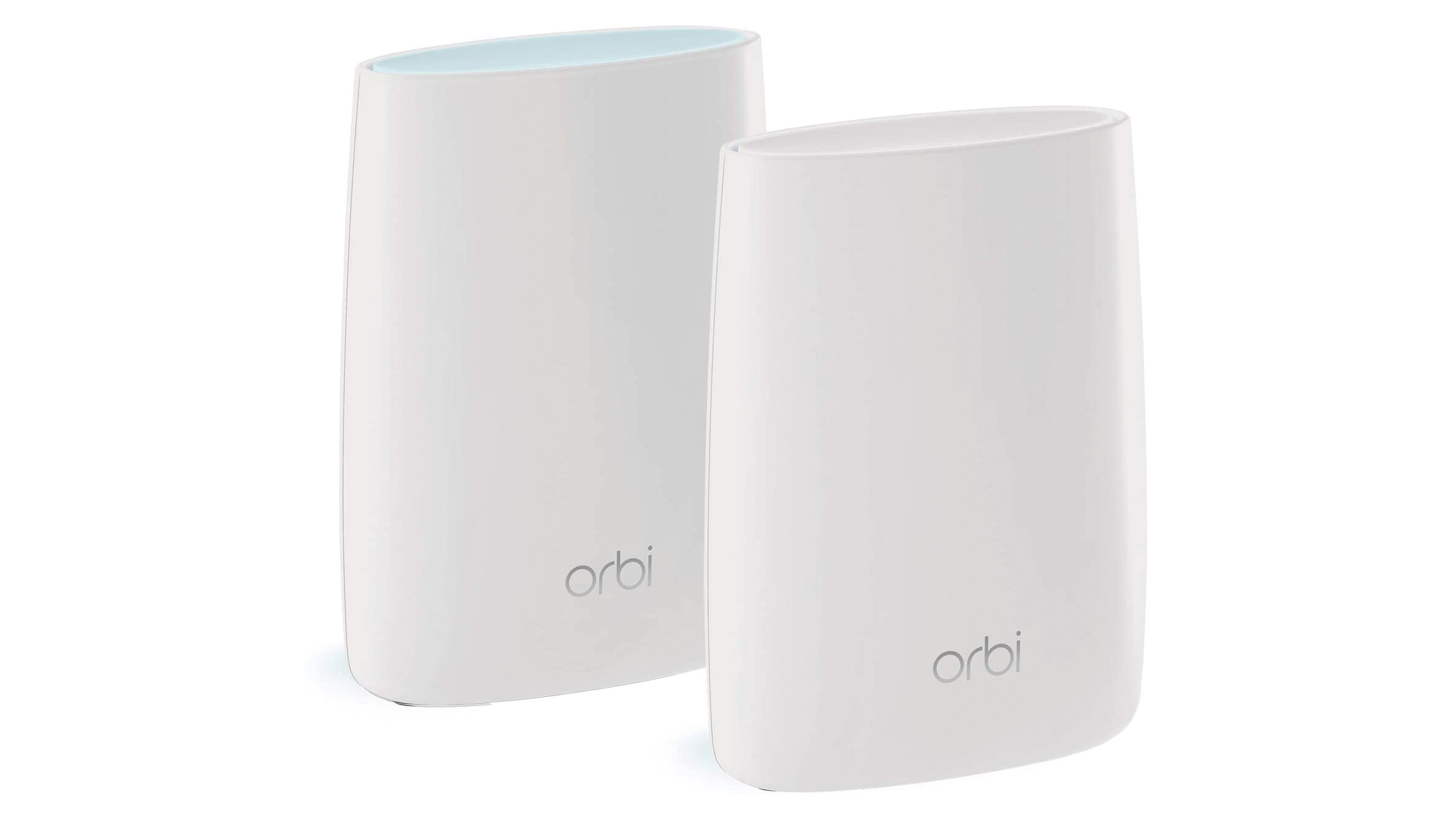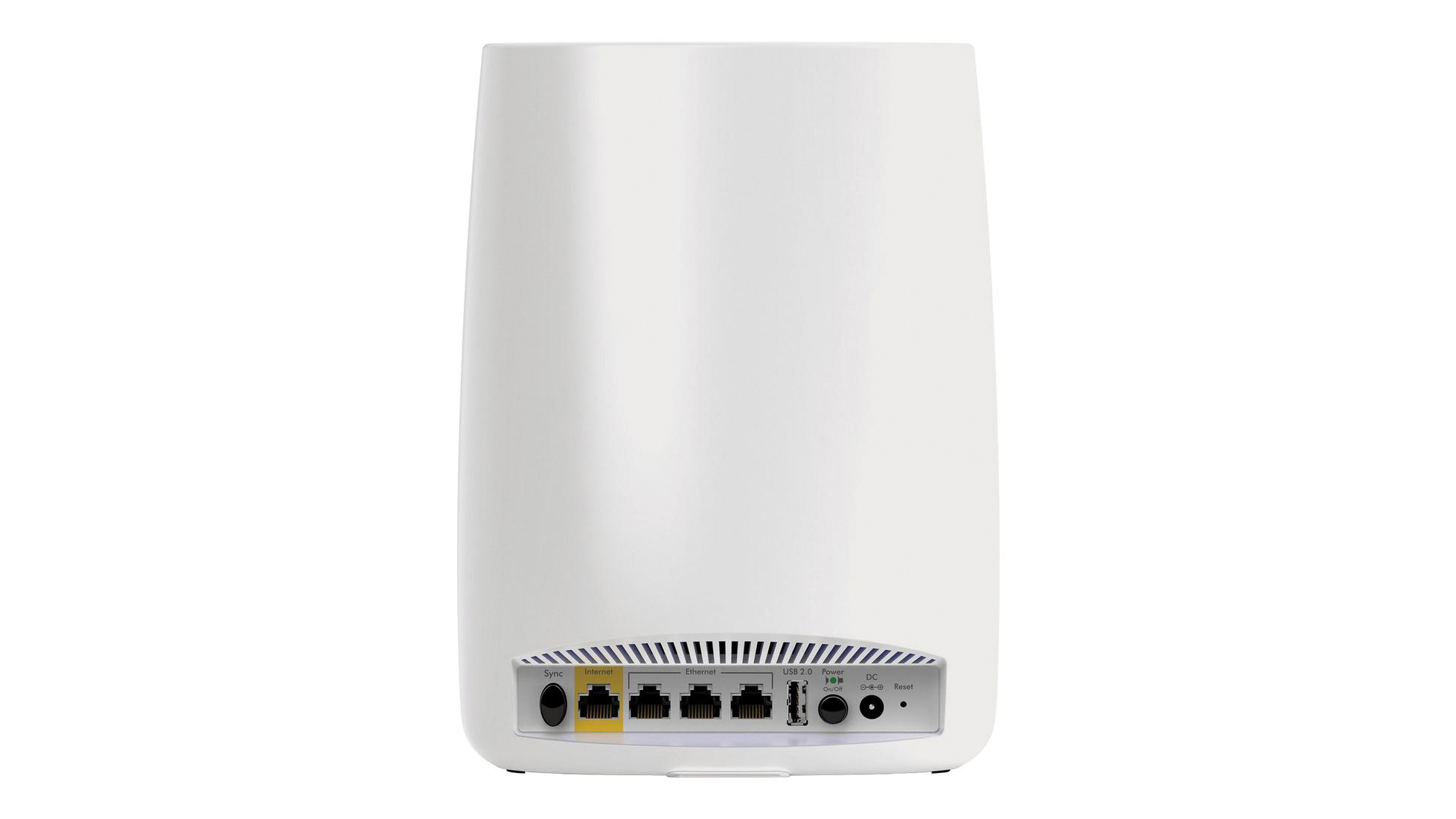Netgear Orbi RBK50 review: The perfect all-round mesh
Plenty of features, user-friendly management and top-flight performance


-
+
Blazing performance
-
+
Four Ethernet ports per node
-
+
User-friendly interface
-
-
Expensive

Netgear offers a whole family of Orbi mesh systems, and this original model (product number RBK50) has been out for more than three years now. Despite its age, though, it remains in our view the best of the bunch – at least for those who don’t need next-generation 802.11ax, also known as Wi-Fi 6.
That’s partly down to its excellent performance. The Orbi’s tri-band design ensures that communications between the two stations don’t slow down the client connection, and the backhaul radio runs at a lightning-fast 1,733Mbits/sec with 4x4 MIMO, making it speedier than almost any other rival – save for the Asus ZenWiFi AC and BT Whole Home Wi-Fi systems.
That being the case, it was no surprise to see the Orbi come close to the top of the table in our speed tests. It couldn’t quite best the Asus ZenWiFi AC, but overall it achieved a highly commendable second place, providing download speeds that will far exceed most people’s requirements even in the most out-of-the-way locations. Make no mistake, this silver medallist is no also-ran.
Similarly, when it comes to features the Orbi isn’t quite such an overachiever as the Asus, but it offers all the key network management options you’re likely to want. The web portal is clean and easy to navigate, while the Orbi smartphone app is impressively responsive, and offers a handy fingerprint login option. Whichever you’re using, you can tweak your DHCP, DNS and port forwarding settings to your heart’s content. You can also adjust the wireless channels for your 2.4GHz and 5GHz radios, although you can’t split them off into separate networks.
On top of that, there are a few distinctive extras to appreciate. One is a built-in VPN server, which allows you to “dial in” to your home LAN from anywhere on the internet, using the industry-standard OpenVPN protocol. This really couldn’t be easier to use: there’s almost nothing to configure, and links to documentation and client software are embedded directly into the relevant page of the web portal. You can easily set your router up with a memorable address too, courtesy of integrated support for No-IP, DynDNS and Netgear’s own dynamic DNS service.

Then there’s the optional Netgear Armor service, offered in partnership with Bitdefender, which enables router-level security scanning and automatic blocking of malicious websites. At £60 a year it’s not exactly cheap, but your subscription also entitles you to install Bitdefender Total Security on all the computers and phones on your home network.
Finally, there’s Netgear’s integrated parental controls, provided by Circle. These are managed in the separate Circle app, which lets you review the websites your kids have been visiting, filter sites by category and age-appropriateness, and approve or block individual services such as Facebook, Netflix and FaceTime. Our one gripe here is that, while you can manually suspend internet access for individual devices, you can’t set a schedule unless you shell out £46 per year for Circle’s Premium service, which also includes more detailed usage monitoring. If you prefer, you can switch the Orbi into bridge mode and use a separate router to handle your access controls and other network services, as with the BT Whole Home Wi-Fi kit.
So much for the technical side – what about the practicalities? The Orbi units themselves are rather abstract-looking things, but their curvy design is gentler on the eye than the blocky Asus ZenWiFi AC units. For that extra touch of style, the ring around the top that glows various colours to alert you to errors and events is positively tasteful.
At the rear, four Gigabit Ethernet ports offer decent scope for wired expansion (although bear in mind that one will be occupied by the connection to your modem). There’s also a USB 2 port, but note that only printer connections are supported – if you want to make an external hard disk available over the LAN, you’ll need to connect it to a PC and share it the old-fashioned way.
For some roles the Orbi will be overkill; you can get a perfectly functional extender system for a rather lower price than what the RBK50 is offered at. Nevertheless, if you’re looking for sheer speed and versatility then the Orbi is one of just two products that really stand out from the crowd. The other, of course, is the Asus ZenWiFi AC, and for techie types who demand every feature under the sun that’s surely the better choice. But the Netgear Orbi gives it a run for its money in the performance stakes, while its more user-friendly interface and extra security and parental control options lend it a broader overall appeal. It doesn’t hurt that it costs £30 less than the ZenWiFi AC, either.
Netgear Orbi RBK50 specifications
| Band support | 2.4GHz, 5GHz |
| Radios | Tri-band 802.11ac |
| Ports | 4x Ethernet, 1x USB 2 |
| Additional features | Alexa/Google Assistant support, Armor security (paid subscription) |
| Dimensions (WDH) | 162 x 79 x 203mm |
Get the ITPro daily newsletter
Sign up today and you will receive a free copy of our Future Focus 2025 report - the leading guidance on AI, cybersecurity and other IT challenges as per 700+ senior executives
Darien began his IT career in the 1990s as a systems engineer, later becoming an IT project manager. His formative experiences included upgrading a major multinational from token-ring networking to Ethernet, and migrating a travelling sales force from Windows 3.1 to Windows 95.
He subsequently spent some years acting as a one-man IT department for a small publishing company, before moving into journalism himself. He is now a regular contributor to IT Pro, specialising in networking and security, and serves as associate editor of PC Pro magazine with particular responsibility for business reviews and features.
You can email Darien at darien@pcpro.co.uk, or follow him on Twitter at @dariengs.
-
 ‘Phishing kits are a force multiplier': Cheap cyber crime kits can be bought on the dark web for less than $25 – and experts warn it’s lowering the barrier of entry for amateur hackers
‘Phishing kits are a force multiplier': Cheap cyber crime kits can be bought on the dark web for less than $25 – and experts warn it’s lowering the barrier of entry for amateur hackersNews Research from NordVPN shows phishing kits are now widely available on the dark web and via messaging apps like Telegram, and are often selling for less than $25.
By Emma Woollacott Published
-
 Redis unveils new tools for developers working on AI applications
Redis unveils new tools for developers working on AI applicationsNews Redis has announced new tools aimed at making it easier for AI developers to build applications and optimize large language model (LLM) outputs.
By Ross Kelly Published
-
 Google layoffs continue with "hundreds" cut from Chrome, Android, and Pixel teams
Google layoffs continue with "hundreds" cut from Chrome, Android, and Pixel teamsNews The tech giant's efficiency drive enters a third year with devices teams the latest target
By Bobby Hellard Published